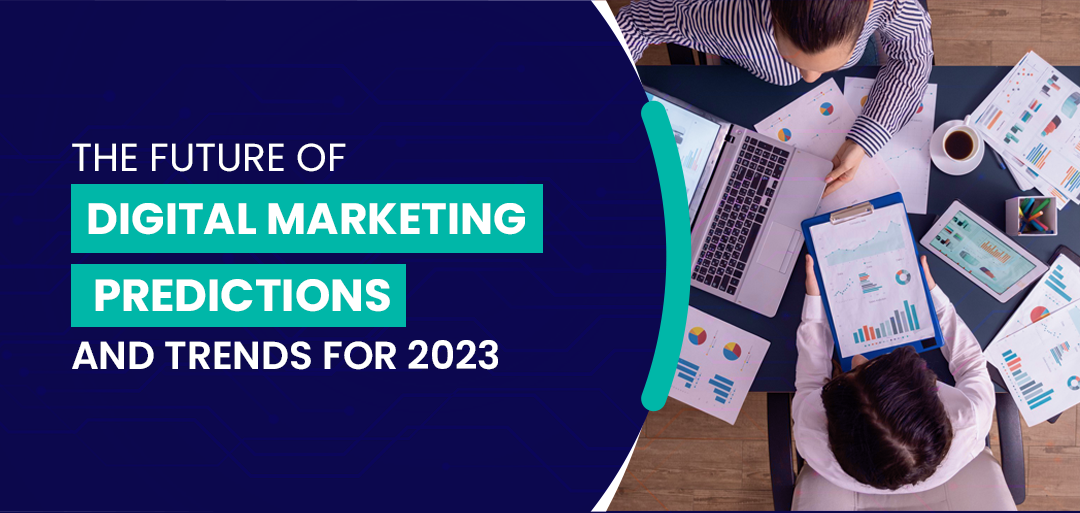As technology continues to advance at an unprecedented pace, the world of digital marketing is constantly evolving. In the coming years, we can expect to see a number of new trends and technologies emerge that will shape the future of digital marketing. In this blog, we’ll take a deep dive into some of the key predictions and trends for 2023 and beyond. From the rise of virtual events and the increasing importance of personalized marketing to the continued growth of video and voice search, businesses will need to stay on top of these emerging trends in order to stay competitive in the digital marketplace.
AI and Machine Learning
One of the most significant trends that will continue to transform the digital marketing landscape is the increasing adoption of artificial intelligence (AI) and machine learning (ML) technologies. These powerful tools can help businesses better understand their customers, personalize content, and optimize their marketing campaigns. In 2023, we can expect to see more businesses embracing AI and ML technologies to gain a competitive edge.
Voice Search
Another trend that’s rapidly gaining traction is voice search. As voice search technology continues to improve, it’s becoming an increasingly important aspect of digital marketing. In fact, some experts predict that voice search will overtake traditional search in the near future. In 2023, businesses that want to stay ahead of the curve will need to optimize their content for voice search and explore new ways to engage with customers through voice-activated devices.
Video Marketing
Video marketing is another trend that’s here to stay. In recent years, video has become one of the most popular and effective forms of content. With the rise of platforms like TikTok and Instagram Reels, short-form video content is becoming increasingly popular. Businesses that can create compelling, shareable video content will be well-positioned to capture the attention of their target audience in 2023 and beyond.
Privacy and Data Security
As consumers become increasingly concerned about privacy and data security, businesses that prioritize these issues will have a competitive advantage. In 2023, we can expect to see more businesses adopting privacy-focused marketing strategies, such as permission-based marketing and data minimization. This will help businesses build trust with their customers and maintain compliance with changing regulations.
Augmented Reality
Augmented reality (AR) technology is another emerging trend in digital marketing that is set to have a significant impact in 2023 and beyond. AR involves overlaying digital images or information onto the real world, creating an interactive and immersive experience for users. While AR has been around for a few years, recent advances in technology have made it more accessible and easier to use for businesses.
AR can also be used to create interactive product demonstrations, allowing customers to explore and learn more about a product in a fun and engaging way. This type of interactive content can be highly effective in capturing the attention of customers and driving engagement and conversion rates.
Conclusion
The future of digital marketing is full of exciting possibilities, and businesses that stay ahead of the curve can reap significant rewards. By embracing emerging technologies such as AI, voice search, video marketing, privacy-focused strategies, and augmented reality, businesses can create highly personalized, engaging experiences that capture the attention of their target audience and drive business results.
However, to succeed in the fast-paced world of digital marketing, businesses must also be willing to adapt and experiment with new approaches and strategies. By staying agile and flexible, and by continually testing and refining their marketing campaigns, businesses can stay ahead of the competition and achieve long-term success. So if you’re looking to grow your business and reach new audiences in 2023 and beyond, now is the time to start exploring these exciting new trends and technologies in digital marketing.
FAQs:
How can businesses incorporate AI and machine learning into their digital marketing strategies?
Businesses can incorporate AI and machine learning into their digital marketing strategies by using these technologies to analyze customer data, create personalized content and recommendations, and optimize their marketing campaigns. They can also use AI-powered chatbots to provide customer support and improve engagement. Additionally, businesses can use AI and machine learning to automate routine tasks, such as A/B testing and email marketing, freeing up valuable time and resources for more strategic initiatives.
How important is voice search for businesses?
Voice search is becoming increasingly important for businesses as more and more consumers use voice-activated devices to search for information and make purchases. Businesses that optimize their content for voice search and explore new ways to engage with customers through these devices will have a competitive advantage. Additionally, businesses that invest in voice search optimization can also improve their search engine rankings and increase their visibility online.
How can businesses create compelling, shareable video content?
Businesses can create compelling, shareable video content by focusing on storytelling, using humor and emotion, and experimenting with different formats and styles. They can also leverage user-generated content and collaborate with influencers to create content that resonates with their target audience. In addition, businesses can also ensure their videos are mobile-friendly and optimized for different social media platforms.
What steps can businesses take to prioritize privacy and data security?
Businesses can prioritize privacy and data security by adopting privacy-focused marketing strategies, such as permission-based marketing and data minimization. They can also implement robust data security measures and ensure compliance with changing regulations, such as GDPR and CCPA. Additionally, businesses can provide clear and transparent communication to their customers about their data collection and usage practices.
How can businesses use augmented reality in their marketing campaigns?
Businesses can use augmented reality in their marketing campaigns to create immersive experiences that engage customers and build brand awareness. They can use AR to showcase products, provide virtual try-on, and create interactive experiences that bring their brand to life. Additionally, businesses can also use AR to provide educational content or information about their products and services in a fun and interactive way.

